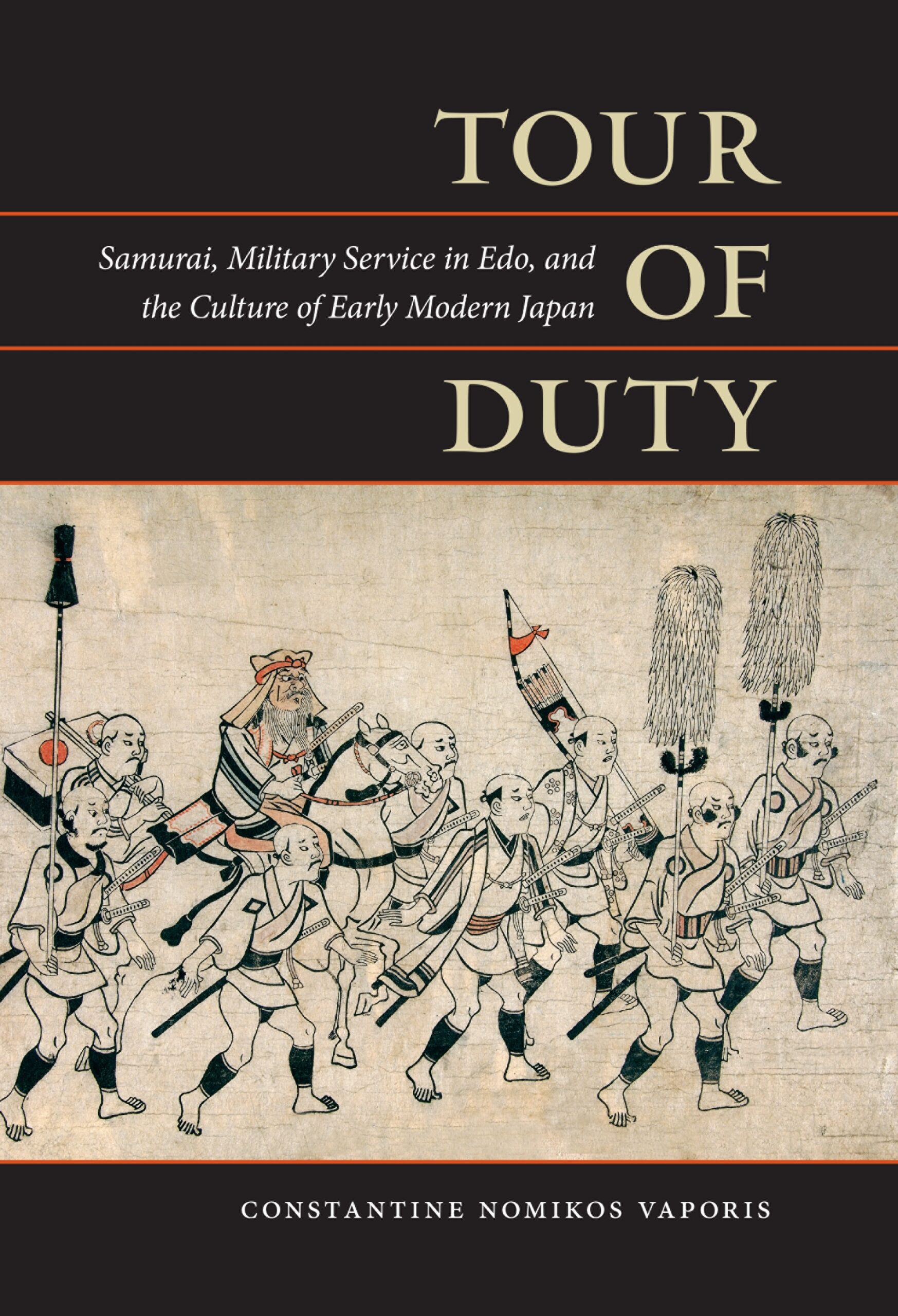Tour of Duty: Samurai, Military Service in Edo, and the Culture of Early Modern Japan
- About the Book
-
Alternate attendance (sankin kotai) was one of the central institutions of Edo-period (1603–1868) Japan and one of the most unusual examples of a system of enforced elite mobility in world history. It required the daimyo to divide their time between their domains and the city of Edo, where they waited upon the Tokugawa shogun. Based on a prodigious amount of research in both published and archival primary sources, Tour of Duty renders alternate attendance as a lived experience, for not only the daimyo but also the samurai retainers who accompanied them. Beyond exploring the nature of travel to and from the capital as well as the period of enforced bachelorhood there, Constantine Vaporis elucidates—for the first time—the significance of alternate attendance as an engine of cultural, intellectual, material, and technological exchange.
Vaporis argues against the view that cultural change simply emanated from the center (Edo) and reveals more complex patterns of cultural circulation and production taking place between the domains and Edo and among distant parts of Japan. What is generally known as “Edo culture” in fact incorporated elements from the localities. In some cases, Edo acted as a nexus for exchange; at other times, culture traveled from one area to another without passing through the capital. As a result, even those who did not directly participate in alternate attendance experienced a world much larger than their own. Vaporis begins by detailing the nature of the trip to and from the capital for one particular large-scale domain, Tosa, and its men and goes on to analyze the political and cultural meanings of the processions of the daimyo and their extensive entourages up and down the highways. These parade-like movements were replete with symbolic import for the nature of early modern governance. Later chapters are concerned with the physical and social environment experienced by the daimyo’s retainers in Edo; they also address the question of who went to Edo and why, the network of physical spaces in which the domainal samurai lived, the issue of staffing, political power, and the daily lives and consumption habits of retainers. Finally, Vaporis examines retainers as carriers of culture, both in a literal and a figurative sense. In doing so, he reveals the significance of travel for retainers and their identity as consumers and producers of culture, thus proposing a multivalent model of cultural change.
- About the Author(s)
-
Constantine Nomikos Vaporis, Author
Constantine Nomikos Vaporis is professor of history at the University of Maryland, Baltimore County (UMBC).
- Reviews and Endorsements
-
- This excellent book, a model of what can be achieved through sustained scholarly engagement with an important topic, will be an invaluable resource for anyone with an interest in Tokugawa Japan and its legacies for the modern era.
—Japanese Studies - One of the important strengths of this book lies in its very rich detail. At the institutional level, this encompasses changes in the legal structure within which daimyo and their retainers operated; at the personal, individual level, it provides readers with a strong sense of the daily life of retainers in Edo and their living circumstances. Quite apart from its significant scholarly merits, this work provides many, many engaging episodes with which to enliven classroom presentations.
—American Historical Review - Tour of Duty brings the daimyo processions back to life. . . . Vaporis has been exploring the subject of alternate attendance over a number of years and is able to present a wealth of evidence to support his argument. It presents a captivating interplay between human actions and preoccupations and their wider historical context.
—Monumenta Nipponica - Vaporis has written a magnificent book on the sankin kotai, or alternate attendance system. . . . Long considered the central political control mechanism of the Tokugawa period, the system has received surprisingly little scholarly attention until now. Filling a major gap in the understanding of Japanese history, the author provides a detailed account of the mechanics of the system and demands placed on daimyo and retainers on tours of duty in Edo. Exploiting the latest archaeological and archival sources, Vaporis makes clear the economic burden of the system on the daimyo, as well as its role as an engine of cultural, intellectual, and material exchange, from the center in Edo and between regions. The author also provides intimate details of the lives of samurai, both on the road to and from Edo and while serving their time in Edo. For all interested in early modern history. . . . Highly recommended.
—Choice
- This excellent book, a model of what can be achieved through sustained scholarly engagement with an important topic, will be an invaluable resource for anyone with an interest in Tokugawa Japan and its legacies for the modern era.
- Supporting Resources
-










